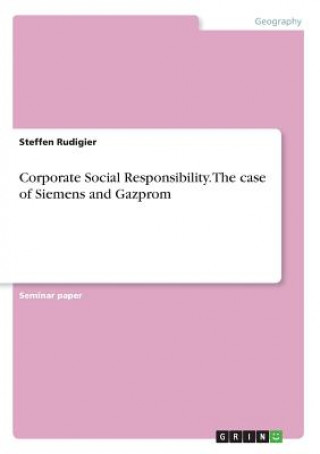
Kód: 19318338
Corporate Social Responsibility. The case of Siemens and Gazprom
Autor Steffen Rudigier
Seminar paper from the year 2010 in the subject Geography / Earth Science - Physical Geography, Geomorphology, Environmental Studies, grade: 75%, The University of Liverpool (Management School), course: MBA, language: English, abs ... celý popis
- Jazyk:
 Angličtina
Angličtina - Vazba: Brožovaná
- Počet stran: 28
Nakladatelství: Grin Publishing, 2018
- Více informací o knize

Mohlo by se vám také líbit
-

Age of Translation
1415 Kč -

IMMIGRANT EDUCATION
426 Kč
Darujte tuto knihu ještě dnes
- Objednejte knihu a zvolte Zaslat jako dárek.
- Obratem obdržíte darovací poukaz na knihu, který můžete ihned předat obdarovanému.
- Knihu zašleme na adresu obdarovaného, o nic se nestaráte.
Více informací o knize Corporate Social Responsibility. The case of Siemens and Gazprom
Nákupem získáte 104 bodů
 Anotace knihy
Anotace knihy
Seminar paper from the year 2010 in the subject Geography / Earth Science - Physical Geography, Geomorphology, Environmental Studies, grade: 75%, The University of Liverpool (Management School), course: MBA, language: English, abstract: Issues like climate change, human rights abuses and poverty dominate our media. Often blamed for responsibility for many of the world's urgent problems, companies are increasingly expected to address them. The term "Corporate Social Responsibility" has therefore become synonymous for initiatives towards sustainable development. This report was established to examine how far corporate social responsibility and sustainable development of multinational corporations has been practiced in recent years, specifically the German Siemens Group and Russia's Gazprom which are the subjects of this investigation. The paper first highlights some key issues of the stakeholder theory and stakeholder salience model, which is then applied to determine the companies' key stakeholders. The most important ones are analysed and compared in terms of power, legitimacy and urgency. Section two deals with the evaluation of the companies' responsible business approaches, pointing out the extent to which these have increased or decreased and the underlying reasons effecting change. The final section seeks to identify the substance of the described approaches by applying the Ponte et.al typology and finally analysing them using the two contrasting perspectives "Good for Business" and "Critical Development". Findings in section one show that classifying and addressing stakeholders is fundamentally through managerial perception and the variable constitutional contexts in which the companies are enacted. The results also reveal that Siemens has to deal cautiously with a wider group of stakeholders than Gazprom, due to the different constitutional situations in Germany and Russia. Gazprom is most influenced by its main-stakeholder, the Russian Federation, whereas the power of other stakeholder groups is relatively low. The investigation of Siemens's socially responsible business approaches in section two revealed that the increasing awareness of CSR in Germany and Siemens's corruption affair were the main drivers intensifying their recent business approaches. CSR in Russia is still immature; consequently Gazprom's initiatives are limited. However, CSR is expected to increase in Russia and Gazprom as a global player must pursue international standards.
 Parametry knihy
Parametry knihy
1042 Kč
- Plný název: Corporate Social Responsibility. The case of Siemens and Gazprom
- Autor: Steffen Rudigier
- Jazyk:
 Angličtina
Angličtina - Vazba: Brožovaná
- Počet stran: 28
- EAN: 9783668677326
- ISBN: 3668677328
- ID: 19318338
- Nakladatelství: Grin Publishing
- Hmotnost: 55 g
- Rozměry: 210 × 148 × 1 mm
- Rok vydání: 2018
Oblíbené z jiného soudku
-

Dune
262 Kč -

Haunting Adeline
620 Kč -

Berserk Deluxe Volume 2
1092 Kč -

White Nights
90 Kč -

Powerless
259 Kč -

Atomic Habits
483 Kč -

Dune Messiah
183 Kč -

Berserk Deluxe Volume 3
1142 Kč -

One Day
276 Kč -

Berserk Deluxe Volume 1
1115 Kč -

Iron Flame
462 Kč -

Surrounded by Idiots
213 Kč -

Harry Potter and the Prisoner of Azkaban (Minalima Edition)
688 Kč -

Gravity Falls Journal 3
440 Kč -

Heaven Official's Blessing: Tian Guan Ci Fu (Novel) Vol. 1
440 Kč -

The Creative Act
586 Kč -

Dune
276 Kč -

Hunting Adeline
624 Kč -

A Little Life
276 Kč -

Children of Dune
174 Kč -

Heaven Official's Blessing: Tian Guan Ci Fu (Novel) Vol. 2
399 Kč -

Bungo Stray Dogs, Vol. 8 (light novel)
367 Kč -

Percy Jackson and the Olympians 5 Book Paperback Boxed Set
953 Kč -

Solo Leveling, Vol. 1
443 Kč -

The Prisoner's Throne
240 Kč -

Court of Thorns and Roses
254 Kč -

Cry Baby Coloring Book
255 Kč -

Fourth Wing
420 Kč -

Icebreaker
199 Kč -

Berserk Deluxe Volume 6
1089 Kč -

Avatar, the Last Airbender: The Kyoshi Novels (Box Set)
750 Kč -

The 48 Laws of Power
601 Kč -

House of Leaves
541 Kč -

Twisted Lies
213 Kč -

Dune Messiah
277 Kč -

No Longer Human
339 Kč -

48 Laws Of Power
471 Kč -

Twisted Games
213 Kč -

Caraval Paperback Boxed Set
905 Kč -

Solo Leveling, Vol. 2
527 Kč -

Open Circuits
910 Kč -

Berserk Deluxe Volume 5
1119 Kč -

Heaven Official's Blessing: Tian Guan Ci Fu (Novel) Vol. 3
441 Kč -

Berserk Deluxe Volume 4
1178 Kč -

Court of Mist and Fury
254 Kč -

SOLO LEVELING V08
431 Kč -

English File Upper Intermediate Multipack A (4th)
530 Kč -

CHAINSAW MAN V14
249 Kč -

Before the Coffee Gets Cold
276 Kč
Osobní odběr Praha, Brno a 12903 dalších
Copyright ©2008-24 nejlevnejsi-knihy.cz Všechna práva vyhrazenaSoukromíCookies



 Vrácení do měsíce
Vrácení do měsíce 571 999 099 (8-15.30h)
571 999 099 (8-15.30h)